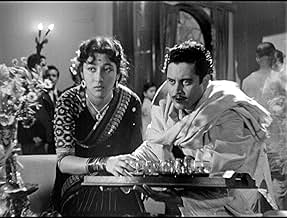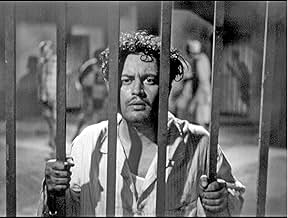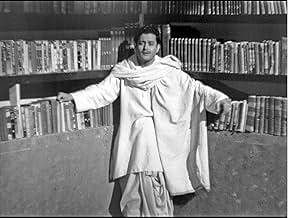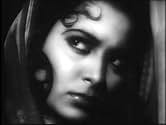IMDb रेटिंग
8.3/10
7.8 हज़ार
आपकी रेटिंग
एक कवि विजय, अपने काम को प्रकाशित करने के लिए संघर्ष करता है. हालांकि गुलाबो नामक एक महिला उसका साथ देती है जिसे उससे और उसके काम से प्यार हो गया है.एक कवि विजय, अपने काम को प्रकाशित करने के लिए संघर्ष करता है. हालांकि गुलाबो नामक एक महिला उसका साथ देती है जिसे उससे और उसके काम से प्यार हो गया है.एक कवि विजय, अपने काम को प्रकाशित करने के लिए संघर्ष करता है. हालांकि गुलाबो नामक एक महिला उसका साथ देती है जिसे उससे और उसके काम से प्यार हो गया है.
Rehman Khan
- Ghosh
- (as Rehman)
Leela Mishra
- Vijay's Mother
- (as Leela Misra)
Moni Chatterjee
- Chatterjee
- (as Moni Chatterji)
फ़ीचर्ड समीक्षाएं
If you are not familiar with the history of Hindi films and are led by the high ratings here to expect a big masala movie indicative of contemporary Bollywood films, you may come away from this film scratching your head and wondering where the high ratings came from--particularly if you are new to Hindi cinema ( as opposed to " Bollywood").HOWEVER, having said that, let me encourage those who are unfamiliar with what is known as the "Golden Age" of Hindi cinema and the historical times that gave birth to this film to do some reading and THEN watch it. 1951 was only 4 years after partition, but unfortunately, many Indians were already becoming disenchanted with the new government's ability, or lack thereof, to bring about the sweeping changes many had hoped would come with the new beginning for the new country. Pyassa came at a time of disenchantment and soul-searching as the new socialist, secular India struggled to find her footing. (Author Tejaswini Ganti does an excellent job illuminating this very different yet important time in Hindi Cinema.) It presents a very bleak picture of greed and corruption, and yet there is a small beacon of hope for understanding, for good to find a way to continue, for equality to stand against injustice, hope for the future. Understanding this is integral to appreciating WHY this is considered one of the greatest films in Hindi cinema history. Learn, watch and enjoy.
Pyaasa does show its age. There are a lot of things that would perplex or annoy the modern viewer such as jumps in continuity and a simplistic set of characters. However, if one looks past that, then the movie reveals a rich story and a deep message. This is even more astonishing considering that the movie was made in the 50s.
This film is a journey into the mind of Guru Dutt and shows the hurt that sensitive minds, such as those of poets', can feel in modern society. As such, its message transcends time and is still relevant today. Those with less sensitive dispositions, such as mine, will not feel left out and will surely appreciate the story too.
The dialogue is beautiful and the songs are sublime. This is a real pity for those who do not understand Hindi since the subtitles (although decent) rob the words of much of their beauty. I know from other reviews on this site that non-Indian viewers often rightly skip the much-disliked song sequences. I still recommend that they sit through them with the subtitles, of course, turned on. This will convey some sense of the beauty of the songs.
There are several moments when the movie seems idiosyncratic. On both occasions that Abdul Sattar (Johnny Walker) broke out into song, the sudden "change" in his voice seemed absurd. Similarly, several bits of dialogue were almost comical when they were meant to be serious, especially in the case of the first publisher. The video itself looks jaded and the sound leaves a lot to be desired. But as I stated earlier, one must look past this to truly enjoy this splendid movie.
One of the striking things about the movie that I must mention is how much India seems to have changed since 1957. Perhaps this is because of the way the movie was shot. The Indian city of the 50s seems very wide and open and even though it is shown teeming with people, there is certain spaciousness about the whole thing. This stands in stark contrast to the clustered urban environment of today.
In all, I would highly recommend this movie to film lovers, both Indian and otherwise.
This film is a journey into the mind of Guru Dutt and shows the hurt that sensitive minds, such as those of poets', can feel in modern society. As such, its message transcends time and is still relevant today. Those with less sensitive dispositions, such as mine, will not feel left out and will surely appreciate the story too.
The dialogue is beautiful and the songs are sublime. This is a real pity for those who do not understand Hindi since the subtitles (although decent) rob the words of much of their beauty. I know from other reviews on this site that non-Indian viewers often rightly skip the much-disliked song sequences. I still recommend that they sit through them with the subtitles, of course, turned on. This will convey some sense of the beauty of the songs.
There are several moments when the movie seems idiosyncratic. On both occasions that Abdul Sattar (Johnny Walker) broke out into song, the sudden "change" in his voice seemed absurd. Similarly, several bits of dialogue were almost comical when they were meant to be serious, especially in the case of the first publisher. The video itself looks jaded and the sound leaves a lot to be desired. But as I stated earlier, one must look past this to truly enjoy this splendid movie.
One of the striking things about the movie that I must mention is how much India seems to have changed since 1957. Perhaps this is because of the way the movie was shot. The Indian city of the 50s seems very wide and open and even though it is shown teeming with people, there is certain spaciousness about the whole thing. This stands in stark contrast to the clustered urban environment of today.
In all, I would highly recommend this movie to film lovers, both Indian and otherwise.
Guru Dutt had the theme for "Pyaasaa" running in his mind for 4 years before he actually got around to making it. He followed the counsel of friends who advised him to make some money before venturing on such an offbeat drama and made such purely commercial, but thoroughly enjoyable, films as "Aar Paar", "C.I.D" and "Mr & Mrs 55" which were all commercially very successful.
"Pyaasa" starts brilliantly - a man lying down, staring at the sky, the flowers - all very happy. A bee starts buzzing over a flower and then, moves down to the grass. The smile on the poet's face is broken as a man's boot uncaringly descends on the bee. Thats more or less the theme of the film. The uncaring attitude of the society where the struggling ones are trampled over mercilessly. Laced through this is the whole romance triangle with one lady dumping her lover for a well-to-do businessman for the sake of money, and a prostitute who loves the poet truly.
The film is filled with some memorable moments and lots of brilliant shots. My favourite is the sequence where Dutt tries to commit suicide is magnificent - there is no dialogue through that 3 minute sequence. But I think the scene would have been even more remarkable had there been no background music.
V.K.Murthy does an outstanding job with the camera. I compare the Guru Dutt-Murthy combo to the Orson Welles-Greg Tolland combo that created "Citizen Kane". Murthy was even better in "Kaagaz ke phool" - but thats for later. This film is an absolute visual treat.
S.D.Burman does a fair job with the music but it is really Sahir Ludhianvi's poetry thats the pride of the songs in this film. Stinging sharp, the words slam the devious ways of the world, the mercenary nature of the society. The climax, though a trifle melodramatic, is brilliantly conceived.
All in all, this is a film thats worth preserving in your DVD collection. This was Guru Dutt's best film and that is saying a lot ! He is now usually touted as the greatest film director in the commercial world of Hindi films. He demonstrates how a film can be both artistically satisfying as well being throughly entertaining to the masses.
"Pyaasa" starts brilliantly - a man lying down, staring at the sky, the flowers - all very happy. A bee starts buzzing over a flower and then, moves down to the grass. The smile on the poet's face is broken as a man's boot uncaringly descends on the bee. Thats more or less the theme of the film. The uncaring attitude of the society where the struggling ones are trampled over mercilessly. Laced through this is the whole romance triangle with one lady dumping her lover for a well-to-do businessman for the sake of money, and a prostitute who loves the poet truly.
The film is filled with some memorable moments and lots of brilliant shots. My favourite is the sequence where Dutt tries to commit suicide is magnificent - there is no dialogue through that 3 minute sequence. But I think the scene would have been even more remarkable had there been no background music.
V.K.Murthy does an outstanding job with the camera. I compare the Guru Dutt-Murthy combo to the Orson Welles-Greg Tolland combo that created "Citizen Kane". Murthy was even better in "Kaagaz ke phool" - but thats for later. This film is an absolute visual treat.
S.D.Burman does a fair job with the music but it is really Sahir Ludhianvi's poetry thats the pride of the songs in this film. Stinging sharp, the words slam the devious ways of the world, the mercenary nature of the society. The climax, though a trifle melodramatic, is brilliantly conceived.
All in all, this is a film thats worth preserving in your DVD collection. This was Guru Dutt's best film and that is saying a lot ! He is now usually touted as the greatest film director in the commercial world of Hindi films. He demonstrates how a film can be both artistically satisfying as well being throughly entertaining to the masses.
10ramta420
This is one of the master piece of Guru Dutt. Its his own life story. In real life he fell in love with Wahida Rehman, but love was unsuccessful. This movie is based on his love story. Hero (Vijay) is a great poet, but people do not recognise him when he is live. But when he dies, people admire his work. Same thing happened to Guru Dutt in real life. His contribution to Hindi movie industry was not recognised by people, as his movies were not conventional, but revolutionary. After he died, people studied his work and he is now known as legend in Hindi cinema.
This is a must watch movie for Hindi movie livers. But please do not expect a typical third class Hindi movie story and songs.
You have to watch it if you want to admire it.
This is a must watch movie for Hindi movie livers. But please do not expect a typical third class Hindi movie story and songs.
You have to watch it if you want to admire it.
10hjakhar
This is an excellent movie which raises many important issues which include unemployment, prostitution in all its worst colours, the exploitation of writers by publishers, breaking family cords etc. Handling of these problems leaves an indelible effect on the viewer and the film tries to shake the souls of the viewers. The lyrics by Sahir Ludhianwi fit the situations and enhance the effect of the film as usual. Mohammad Rafi also sang the songs in his inimitable style of playback acting which is also adds a gem to the film. The level of acting is also very high and special mention has to be made of Waheeda Rahman, Guru Dutt and Rehman. The handling of important scenes keeps viewers glued to the screen till the end. Actually this is one of the best movies made in India.
क्या आपको पता है
- ट्रिवियाDilip Kumar was the first choice for the lead role but due to his absence on the opening day of shooting due to unknown reason director Guru Dutt decided to act as the lead actor.
- कनेक्शनFeatured in Road, Movie (2009)
- साउंडट्रैकJinhen Naaz Hai Hind Par Woh Kahaan Hain
Sung by Mohammad Rafi
Music composed by Sachin Dev Burman
Lyrics by Sahir Ludhianvi
टॉप पसंद
रेटिंग देने के लिए साइन-इन करें और वैयक्तिकृत सुझावों के लिए वॉचलिस्ट करें
- How long is Thirst?Alexa द्वारा संचालित
विवरण
- चलने की अवधि2 घंटे 26 मिनट
- रंग
- पक्ष अनुपात
- 1.33 : 1
इस पेज में योगदान दें
किसी बदलाव का सुझाव दें या अनुपलब्ध कॉन्टेंट जोड़ें































